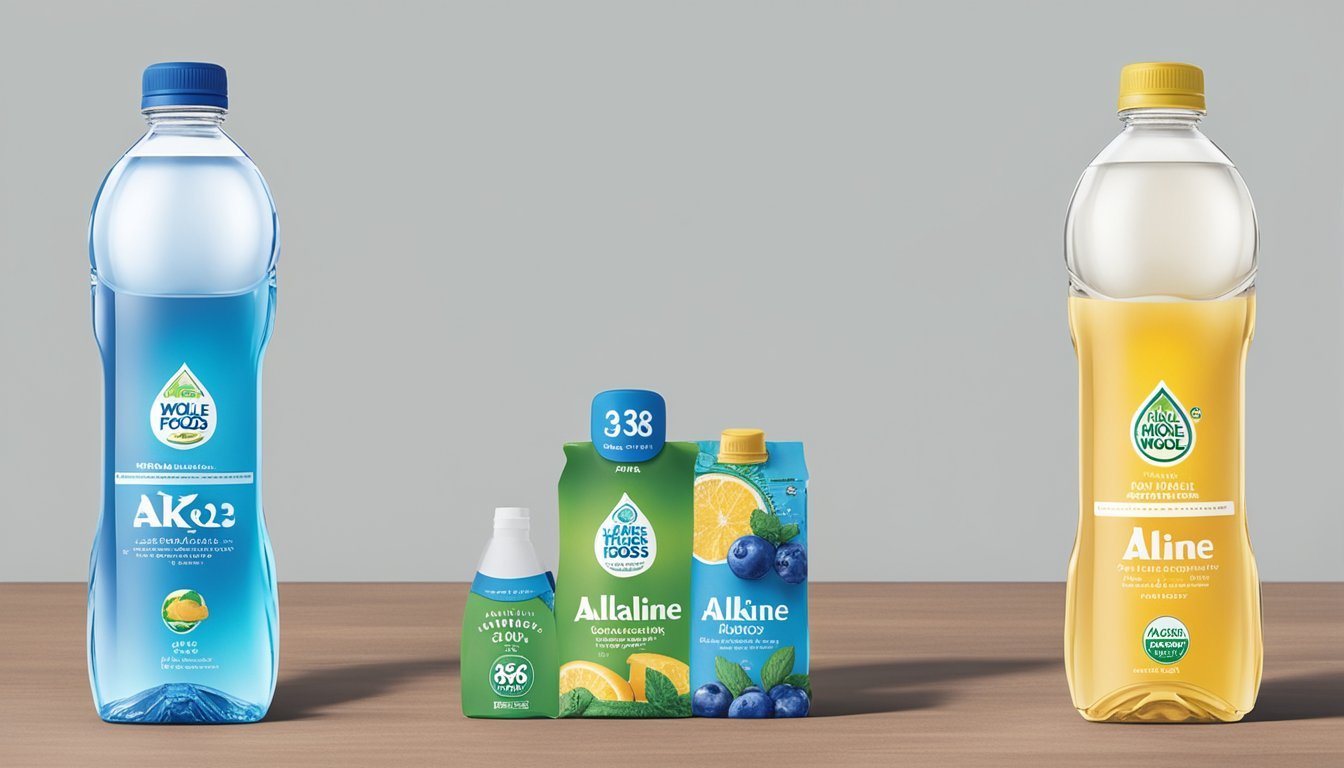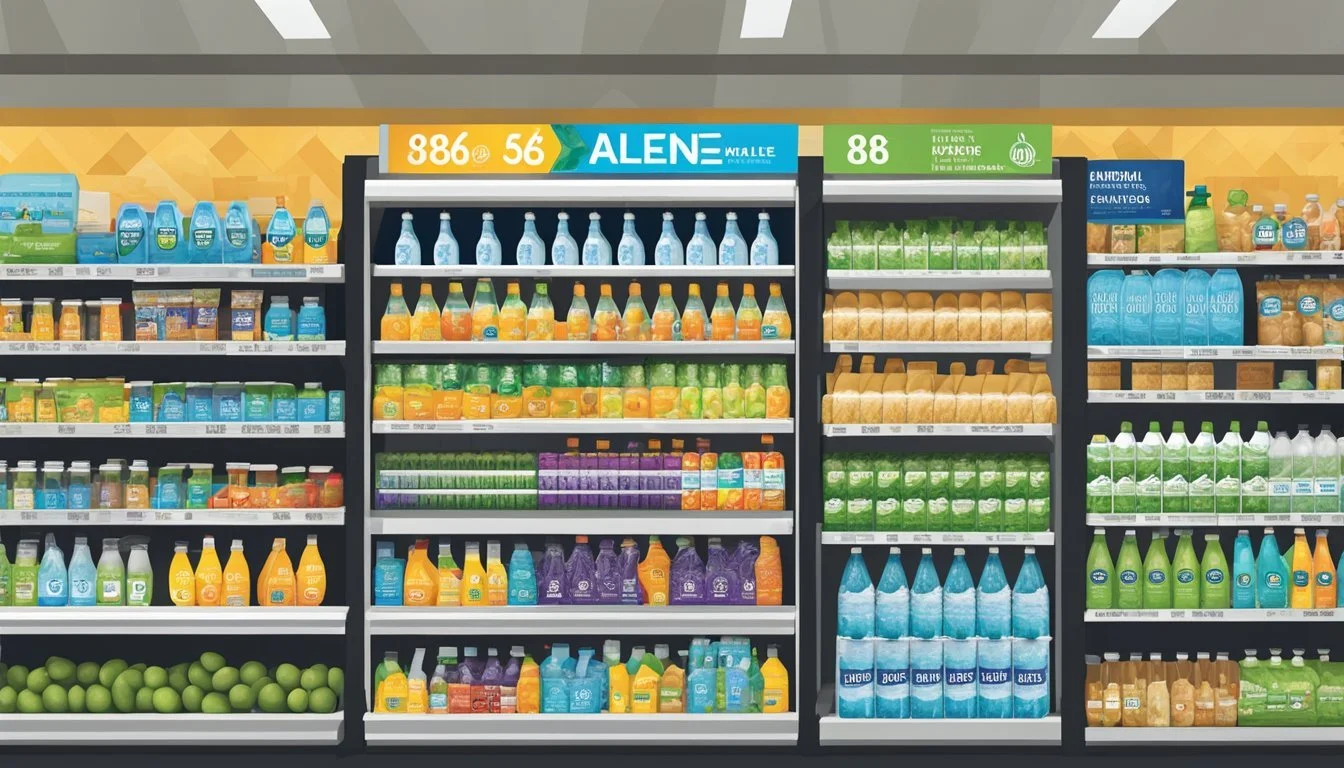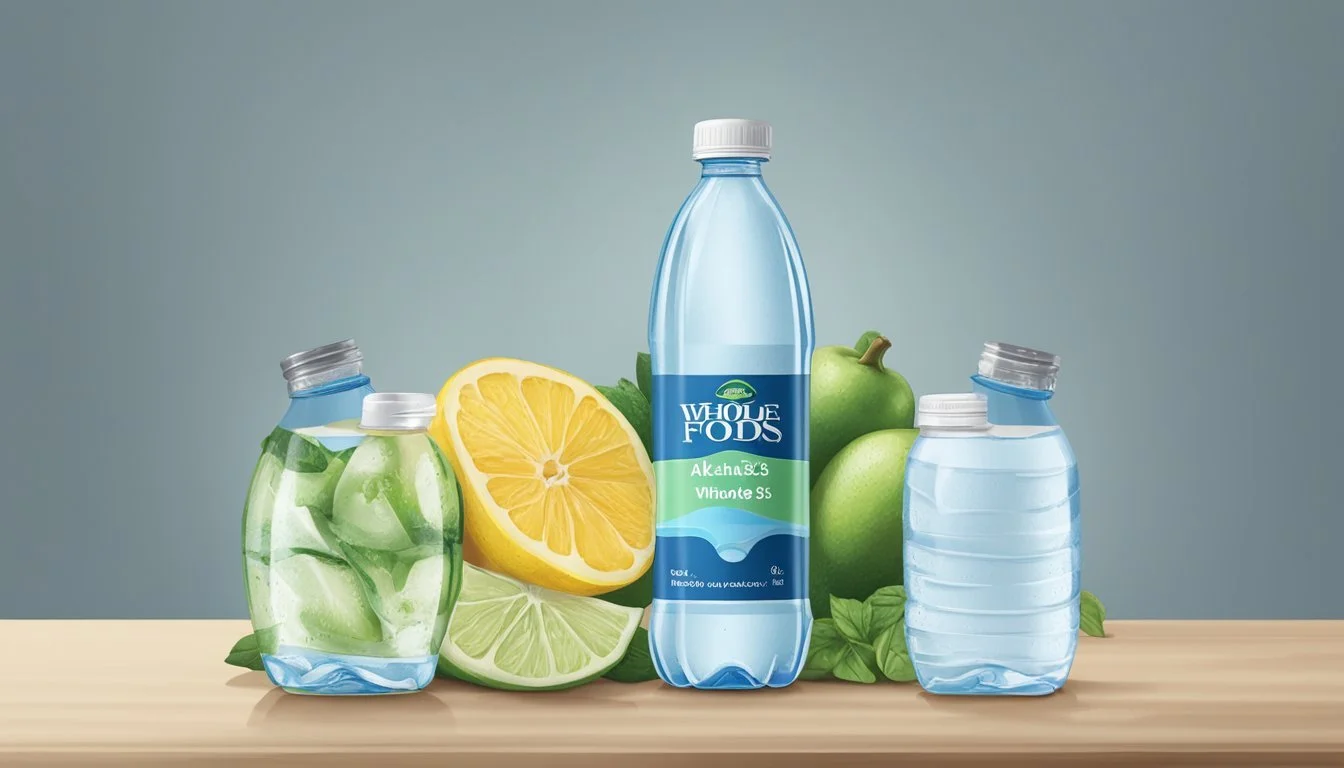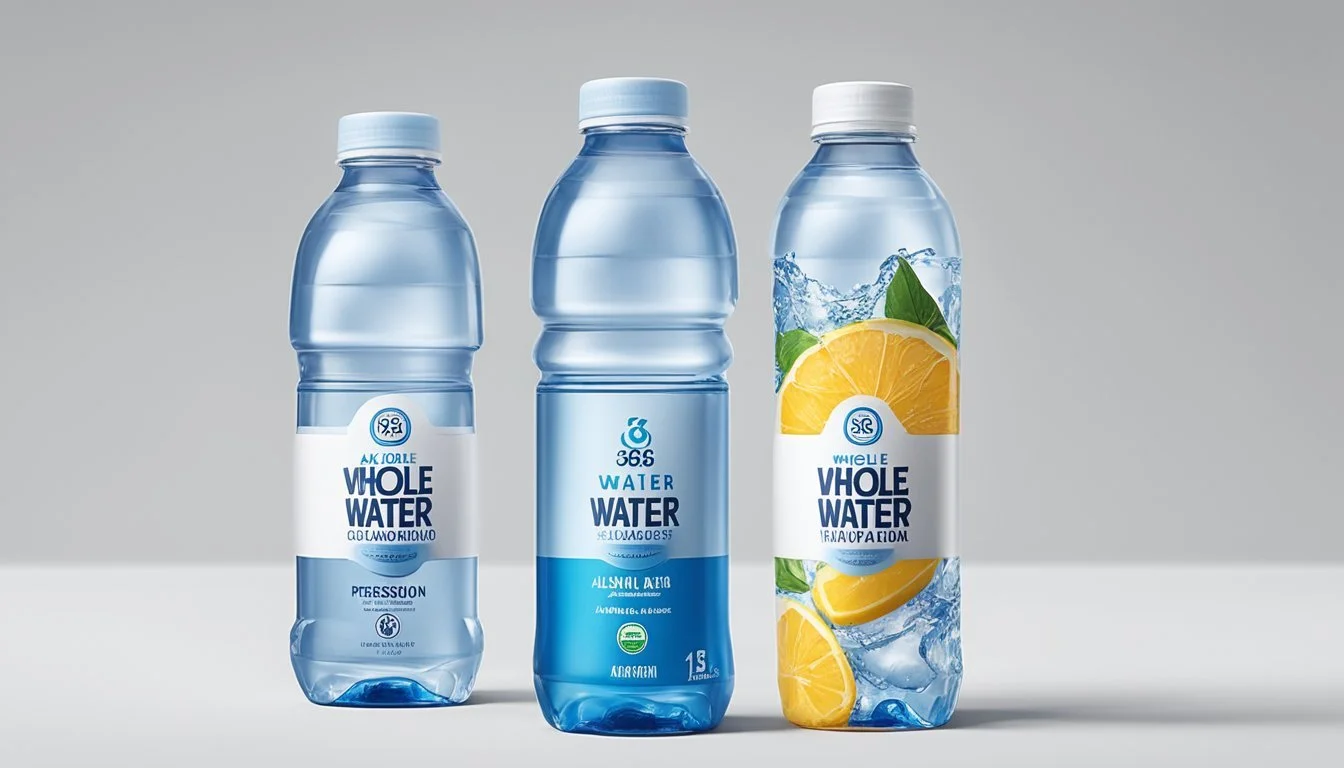Alkaline88 vs. Whole Foods 365
Comparing Bottled Water Quality
When comparing Alkaline88 and Whole Foods 365 bottled water, consumers often look at taste, quality, and health benefits. Alkaline88 boasts an alkaline pH of 8.8, which many believe helps balance body acidity and improve hydration. This makes it a popular choice for those seeking more than just hydration from their water.
On the other hand, Whole Foods 365 Spring Water is appreciated for its affordability and accessibility. It is a more traditional option with a refreshing taste, making it suitable for everyday use. According to recent tests, Whole Foods 365 had lower levels of heavy metals and PFAS, highlighting its commitment to safety and quality.
Both brands have their unique advantages, but the choice between Alkaline88 and Whole Foods 365 ultimately depends on individual preferences and priorities. For those prioritizing alkaline water benefits, Alkaline88 stands out. Meanwhile, Whole Foods 365 offers an economically friendly and safe option for regular consumption.
Overview of Bottled Water Brands
Alkaline88 and Whole Foods 365 represent distinct approaches to bottled water with unique brand profiles and product characteristics.
Alkaline88: Brand Profile
Alkaline88 is well-known in the bottled water market for its high pH level and added minerals. Launched in 2012, Alkaline88 aims to provide consumers with water that supports hydration and balance. The water undergoes an 8-step purification process, resulting in a pH level of around 8.8.
The inclusion of trace minerals like potassium and calcium differentiates Alkaline88 from other brands. This process also involves ionization, which contributes to its alkalinity.
Alkaline88 is widely distributed in major grocery stores across the U.S., appealing to health-conscious individuals seeking enhanced hydration benefits.
Whole Foods 365: Brand Profile
Whole Foods 365 offers a straightforward, cost-effective bottled water option. As a spring water, it provides a natural taste without the addition of any minerals or electrolytes. Whole Foods 365 water is sourced from natural springs, offering a clean and crisp flavor.
Priced economically, it appeals to a wide range of consumers who shop at Whole Foods markets.
Though it does not feature a high pH or added minerals, it is a reliable choice for those seeking basic hydration. The focus remains on quality and affordability, aligning with Whole Foods' brand values.
Scientific Basis of Alkaline Water
The pH level of a liquid plays a crucial role in its classification as acidic, neutral, or alkaline. Alkaline water, with its higher pH, has garnered attention for various potential health benefits.
Understanding pH Levels
The pH scale ranges from 0 to 14. A pH of 7 is neutral, anything below 7 is acidic, and above 7 is alkaline. Regular tap water typically has a pH close to 7, while alkaline water typically ranges from 8 to 10 on the pH scale.
Alkaline water can occur naturally or be produced through electrolysis, which raises its pH level. Natural sources include springs in areas with high mineral content. Many bottled alkaline waters are created by adding electrolytes or minerals.
Health Claims Surrounding Alkaline Water
Advocates assert that alkaline water can neutralize acid in the bloodstream, leading to various health benefits. Claims include improved hydration, increased energy levels, and better metabolism.
Some believe it helps balance the body's pH, which may reduce acid reflux and improve bone health. However, it is essential to note that scientific evidence supporting these claims is limited.
While no significant negative side effects have been documented, experts emphasize the necessity for more detailed research to validate the purported benefits.
Composition and Quality of Water
Alkaline88 and Whole Foods 365 offer different attributes in their bottled water options. This section evaluates the mineral content and safety standards, ensuring consumers are informed about their choices.
Mineral Content Comparison
Alkaline88 is known for its high pH, usually around 8.8. This water undergoes a process that includes reverse osmosis and the addition of minerals such as calcium, magnesium, and potassium. This enhances its alkalinity and offers potential health benefits such as improved hydration and electrolyte balance.
Whole Foods 365 provides several options, including spring water and purified water. Their 365 Everyday Value Alkaline Water has a pH of 9.5+ and is ionized to maintain its alkalinity. The composition varies by type, but their spring water typically contains natural minerals sourced from spring locations.
Water Brand Calcium (mg/L) Magnesium (mg/L) Potassium (mg/L) Alkaline88 20-30 5-15 10-20 Whole Foods 365 15-25 3-12 8-18
Safety Standards and Contaminants
Ensuring the safety and purity of bottled water is crucial. Alkaline88 adheres to rigorous safety standards, including testing for contaminants like lead and ensuring compliance with FDA regulations. They promote their water as free from harmful substances, providing a safe drinking option.
Whole Foods 365 has faced scrutiny for some of its bottled water options. For instance, a review found that their Starkey Spring Water had arsenic levels just below the federal limit of 10 ppb, raising concerns about safety. Whole Foods asserts that their priority is to deliver high-quality, safe water to consumers. Regular testing is conducted to meet federal and state regulations.
According to Consumer Reports, some bottled waters from Whole Foods contain PFAS chemicals but remain within legal limits. Being aware of these issues helps consumers make an informed choice about their drinking water.
Hydration and Health Benefits
Hydration is a key element for maintaining proper bodily functions and overall health. Alkaline88 and Whole Foods 365 bottled water claim to offer unique health benefits beyond hydration.
Hydration Efficiency
Proper hydration maintains blood viscosity and supports overall health. Alkaline88, with a pH level of 8.8, is believed to hydrate more effectively due to its unique mineral content. This water contains electrolytes like calcium, potassium, and magnesium, which are crucial for maintaining hydration status.
Whole Foods 365 water, though lower in pH, meets basic hydration needs effectively. It offers standard hydration and may appeal to those who prefer a more neutral pH. Both brands help maintain adequate fluid levels, but Alkaline88 might provide additional benefits due to its higher electrolyte content.
Impact on Bodily Functions
Hydration directly impacts bodily functions such as kidney filtration, lung performance, and liver detoxification. Alkaline88's higher pH level and added electrolytes could potentially aid in reducing acidity in the bloodstream, thereby supporting kidney function and helping detoxify the body.
Whole Foods 365 water also ensures good hydration, which is essential for all major organ systems. Proper hydration from any water source can enhance lung performance, aid in nutrient transport, and support bone density. Both waters hydrate, but Alkaline88’s composition may offer slight advantages for specific bodily functions due to its alkaline nature.
Long-Term Health Effects
Long-term health effects of hydration depend significantly on consistent fluid intake and quality. Alkaline88’s proponents argue that it helps in slowing aging markers, improving digestion, and preventing diseases related to acidity. Regular consumption may benefit bone density and promote healthier skin, thanks to its enhanced mineral content.
Whole Foods 365 water, being closer to neutral and free from additives, represents a baseline for maintaining regular hydration without additional claims of health benefits. Long-term benefits are likely similar when it comes to fundamental hydration, although Alkaline88’s unique properties might offer slight incremental benefits when consumed regularly.
Taste, Texture, and User Experience
Exploring the differences between Alkaline88 and Whole Foods 365, we examine their taste, texture, and how consumers perceive these bottled waters. Each offers a unique overall experience shaped by their specific characteristics.
Sensory Profile: Alkaline88 vs Whole Foods 365
Alkaline88 stands out with its smooth, almost velvety texture. The addition of Pink Himalayan Rock Salt provides a clean, crisp taste without any aftertaste. With a pH level of 8.8, this water caters to those seeking a slightly alkaline option.
On the other hand, Whole Foods 365 water is known for its neutral taste and light texture. It lacks the added minerals found in Alkaline88 but presents itself as a straightforward, refreshing option.
Both brands focus on delivering a pure taste, but they achieve it through different methods. While Alkaline88 emphasizes its ionization process and added minerals, Whole Foods 365 offers simplicity and purity without additional flavors or carbonation.
Consumer Preferences and Perception
Consumers gravitate towards Alkaline88 for its unique taste and texture, often noting the enhanced hydration due to its higher pH level and added minerals. The smoothness of the water, attributed to its ionization and Pink Himalayan Rock Salt, is frequently highlighted in reviews.
Whole Foods 365 attracts those looking for an accessible, no-frills bottled water option. It’s favored for its affordability and clean, neutral profile, making it a go-to choice for everyday hydration.
Each brand appeals to different consumer bases. Alkaline88 draws in those prioritizing enhanced hydration and a premium experience. Whole Foods 365 is preferred by consumers seeking simplicity and value without compromising on quality.
Environmental and Ethical Considerations
When considering bottled water choices, it's essential to examine the ecological impact and ethical standpoints of their sourcing and production methods.
Bottled Water and Ecological Footprint
Bottled water's environmental cost includes the energy required for extraction, bottling, and transportation. Alkaline88 and Whole Foods 365 source their water from natural springs, involving fewer resources than purifying tap water. However, transporting bottled water, especially heavy containers, increases carbon emissions.
Plastic waste is another significant issue. Single-use plastics used for bottling create long-lasting ecological damage. Alkaline88 has started using BPA-free bottles to mitigate this concern, while Whole Foods 365 focuses on recycling schemes. Consumer choices also play a critical role in minimizing this footprint. Opting for larger, reusable containers can considerably reduce waste compared with individual bottles.
Ethics of Water Source and Production
Ethical considerations involve the source and production methods of bottled water. Alkaline88 uses naturally occurring minerals from rocks to assure quality, while Whole Foods 365 emphasizes strict guidelines to ensure safe products. Nevertheless, recent reports have raised concerns about potential contaminants like PFAS and arsenic.
Whole Foods 365 has faced scrutiny due to arsenic levels approaching the federal limit. Transparency in testing results and adherence to safety regulations are vital for consumer trust. Ethical production also considers fair compensation for local communities and preventing over-extraction of natural springs, ensuring a sustainable and just water supply.
Market and Availability
Alkaline88 and Whole Foods 365 offer different experiences to consumers, especially in how they are distributed and perceived in terms of value.
Distribution Channels and Accessibility
Alkaline88 is widely available in various formats, including 500ml, 700ml, 1-liter, 3-liter, and 1-gallon sizes. It's distributed through many grocery stores and is specifically mentioned to be available at all Whole Foods locations in Florida. Additionally, Alkaline88 products can be bought online, providing greater accessibility across states.
Whole Foods 365, on the other hand, is primarily available through Whole Foods Market locations. Since Whole Foods has numerous stores across various states, customers can easily find the 365 brand in-store. The distribution is somewhat limited to Whole Foods outlets, thereby constricting its availability compared to Alkaline88.
Pricing and Value Perception
At 69 cents per unit, Whole Foods 365 offers an affordable option, particularly appealing to budget-conscious consumers. Despite its lower price, some reviews suggest it lacks a premium taste, hinting at a trade-off between cost and quality. This can affect its value perception among more discerning water drinkers.
Alkaline88 is positioned as a premium brand, often higher in price, driven by its special features like higher pH levels and electrolytes. The pricing reflects its market positioning, appealing to those who prioritize health benefits and are willing to spend more on premium water. This contributes to a higher value perception despite the cost.
Comparison with Other Bottled Waters
When comparing Alkaline88 and Whole Foods 365, it's also important to place them within the broader context of the bottled water market. This involves looking at both premium brands and more affordable alternatives, including tap water.
Premium Brands in the Market
Starkey: Starkey is a premium brand known for its high pH level, sourced from geothermal springs. It stands out due to its unique mineral composition.
Icelandic Glacial: Icelandic Glacial offers water sourced from the Ölfus Spring, with natural alkalinity and exceptional purity. Its refreshing taste and mineral-rich content make it a popular choice.
Essentia Water: Essentia Water is notable for its ionized, alkaline water with a pH of 9.5. It's marketed for its rehydration qualities and claims to provide better hydration compared to other brands.
Smartwater: Produced by Coca-Cola, Smartwater is vapor-distilled for purity and enhanced with electrolytes for taste. While not as alkaline as Essentia or Alkaline88, it's positioned as a premium, hydrating option.
Affordable Alternatives and Tap Water
Whole Foods 365: This spring water is budget-friendly but may taste average compared to higher-end brands. It's a practical choice for daily consumption, offering a balance between cost and quality.
Nestlé: Nestlé’s various bottled water brands, including Pure Life, cater to a budget-conscious audience. Despite their affordability, concerns have been raised about the sources and purity levels.
Tap Water: Depending on the region, tap water can be a reliable and highly affordable option. However, issues like contaminants or high sodium levels can affect taste and safety.
Alkaline88: Positioned slightly above average in price, Alkaline88 offers added value with its high pH level of 8.8 and mineral content, appealing to health-conscious consumers seeking alkaline benefits.
Regulation and Certification
Ensuring the safety and quality of bottled water is critical for consumers. Alkaline88 and Whole Foods 365 both adhere to strict standards to meet regulatory and certification requirements.
Drinking Water Standards and Compliance
Alkaline88 adheres to both FDA and EPA regulations that set guidelines for bottled water quality. The FDA enforces standards that match the EPA's for tap water, ensuring that Alkaline88 meets strict safety criteria. With its ionized water, Alkaline88 maintains a consistent pH level of 8.8, promoting its claimed health benefits.
Whole Foods 365 also complies with FDA and EPA standards. Testing reveals that the spring water variant sometimes has arsenic levels close to federal limits, though it remains within safe consumption levels. Ensuring safety, Whole Foods conducts regular quality tests on its products.
Labels and Health Regulations
Alkaline88 promotes its high pH and mineral content on its labels, touting benefits like improved hydration and detoxification. The label also includes information about its certification and compliance with FDA regulations. Claims are reviewed periodically to meet guidelines.
Whole Foods 365 labels emphasize purity and origin, often specifying the spring source. Health claims are more restrained, focusing on natural ingredients. The spring water label includes critical information such as possible chemical contaminants and regulatory certifications, keeping consumers informed.
Both brands must comply with labeling laws to avoid misleading claims, providing transparency into their health and safety commitments.








